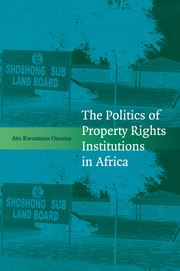Book contents
- Frontmatter
- Contents
- List of Maps and Tables
- Acknowledgments
- List of Abbreviations and Acronyms
- 1 Map of Botswana
- 2 Map of Ghana
- 3 Map of Kenya
- 1 Divergent Attitudes Towards Property Rights Institutions
- 2 Explaining Institutional Choice and Change
- 3 Varying Responses by Ghanaian and Batswana State Leaders
- 4 Traditional Leaders Take Charge in Akyem Abuakwa and Ga
- 5 Building and Then Demolishing Institutions in Kenya
- 6 Endogenous Contributions to Institutional Change
- 7 Conclusion
- Appendix: Notes on Field Research
- Index
- References
6 - Endogenous Contributions to Institutional Change
Published online by Cambridge University Press: 04 May 2010
- Frontmatter
- Contents
- List of Maps and Tables
- Acknowledgments
- List of Abbreviations and Acronyms
- 1 Map of Botswana
- 2 Map of Ghana
- 3 Map of Kenya
- 1 Divergent Attitudes Towards Property Rights Institutions
- 2 Explaining Institutional Choice and Change
- 3 Varying Responses by Ghanaian and Batswana State Leaders
- 4 Traditional Leaders Take Charge in Akyem Abuakwa and Ga
- 5 Building and Then Demolishing Institutions in Kenya
- 6 Endogenous Contributions to Institutional Change
- 7 Conclusion
- Appendix: Notes on Field Research
- Index
- References
Summary
This chapter moves on from the theme of institutional choice that has preoccupied the previous empirical chapters to explore the issue of institutional change. More specifically, the subject of endogenous contributions to institutional change is explored. As stated in Chapter 2, considering endogenous change is particularly interesting to this study because institutions that govern land rights display clear positive feedback effects. The specific case of land documentation in Kenya is used to illustrate what in Chapter 2 was called the contradictory potential of institutions. By this is meant the ability of the same institution to simultaneously generate forces dedicated to its reinforcement while also spawning and supporting actors that thrive on its subversion.
As noted in Chapter 2, the goal here is not to deny other sources of change in self-reinforcing institutions. As was discussed in Chapter 2, exogenous shocks that either changed the leadership of societies or drastically altered the environment to which leaders responded were at the root of burgeoning institutional change in Ghana in 2000 and drastic institutional transformation in Akyem Abuakwa just before the middle of the 1900s. As shown in Chapter 5, Kenya had the exogenous shock of re-democratization to blame for drastic changes in how leading state leaders exploited land and their consequent attitudes toward the institutions that govern land rights.
This chapter fills the gaps in the story of institutional change in Kenya by examining what more marginal characters who were not in the upper echelons of state power and policymaking did with these property rights institutions.
- Type
- Chapter
- Information
- The Politics of Property Rights Institutions in Africa , pp. 176 - 193Publisher: Cambridge University PressPrint publication year: 2009



